10 people whose work has rocked the web design industry
The net Awards 2014 features a special award for outstanding contribution. Help us to decide which of these 10 individuals should win it.
We created the category of Outstanding Contribution in the net Awards 2014 to honour those people who have contributed a fantastic body of work to the industry that has changed the way web designers do their jobs. And here are the 10 nominees.
Everyone you see here has built useful tools, written books and articles, and inspired thousands of people by speaking at conferences. Every one of them is deserving of special recognition, but there's only one award! Read on and help us to decide who should get it.
Molly E. Holzschlag
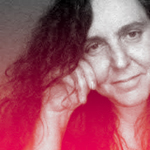
Molly is the author of over 30 books on the web, including The ZEN of CSS Design: Visual Enlightenment for the Web and Transcending CSS: The Fine Art of Web Design. She is an advocate for the open web and was a key figure in persuading the major browser vendors to support web standards. She recently has led the W3C's CSS Working Group and Accessibility Community Group which works to overcome the barriers that make it difficult for people with disabilities to access the web.
Molly is currently battling serious illness and resides in US. The web design community is banding together to help cover her medical expenses.
Christopher Murphy
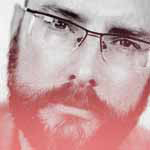
Christopher is a Belfast-based writer, designer and educator. He has written for many publications including Five Simple Steps, Offscreen, 8 Faces and The Manual, and publishes a typography journal, Glyph.
What are your main areas of expertise?
I've been a practising designer for over two decades and my work has spanned a variety of outcomes, both analogue and digital.
Daily design news, reviews, how-tos and more, as picked by the editors.
For the last decade, my passion has been improving web design education. I believe education in our area is, for the most part, broken, and I'm focused on rethinking and improving it. I've just been given approval to establish a new course, teaching interaction design at The Belfast School of Art. In a move to open up education, I've shared our curriculum on GitHub. I'd welcome any feedback and input. If we shape curricula together, I believe we might do a better job.
Give us a summary of your career so far.
I've worked across a variety of different areas. I've designed stamps for The Royal Mail; I've worked as a sound artist, exhibiting around the world; I've run an independent record label; I've worked as an educator; and, most recently, I've written a number of books and articles for, amongst others, Five Simple Steps, 8 Faces, and Offscreen.
What have you been working on over the last year?
My focus over the last year has been on raising awareness around mental health issues. I suffer from depression and last year was at a very low point, in part due to the relentless pressures of working in our industry.
I wrote a number of articles about this in 2013, one in particular received a considerable amount of traffic. I think it's important to raise awareness of mental health issues, especially in a fast-paced industry like ours, which can lead many to burnout or breakdown.
More recently, I've been speaking about the stresses of working in our industry, and outlining techniques for 'managing a mind', at a number of conferences, including a panel on the topic at Brooklyn Beta.
I've been surprised and humbled by the reaction to both my writing and speaking on this topic. More people suffer from depression and anxiety than might immediately be apparent, I hope that my writing and speaking on the subject is helping others.
What have been the particular high points of your career?
I'm happy to say I've had many. Having my work featured in Eye magazine was an honour. The books I've written have also been high points.
Most of my high points now are coupled with the intense pride for the students I teach who go on to do great things. I'm proud of their achievements, which – in many cases – are considerable.
What are you excited about at the moment?
I'm excited about life. Last year was a low point for me, I'm lucky to have come out the other end. When you've been to the edge of the abyss, and returned, you can see excitement in the smallest, most inconsequential details.
Tell us about an important lesson you've learned in your career.
I still vividly recall my first mentor – my art teacher, Mark Cheverton, who was a devout Christian, not prone to swearing – looking me in the eye sternly, and saying, “For fuck's sake, Chris, stop procrastinating and bloody well get on with it!”
Twenty years later, I find myself giving my students the same advice. The only difference is that the swearing comes naturally to me.
Name an 'unsung hero', someone you admire who deserves more recognition for their work.
Cara, my wife, is my unsung hero. Even in the darkest moments, when I've been at rock bottom, she's been there for me. Believe me, that's no small task, and I owe her an enormous debt of gratitude.
Brad Frost

Brad is a web designer, speaker and writer based in Pittsburgh, PA. He is the creator of This Is Responsive, Pattern Lab, Mobile Web Best Practices, and WTF Mobile Web.
What are your main areas of expertise?
There's no such thing as an expert in this field :). But I've been trying to create web experiences that look and function beautifully on a never-ending stream of connected devices for about four years now.
Give us a summary of your career so far.
I started my career out in Pittsburgh making brochureware websites for real estate companies. When the US real estate bubble burst, I moved to New York City and took a job making e-commerce sites for high-end fashion brands.
After a couple years cutting my teeth customising Wordpress and Magento sites, I moved to R/GA where I took a job as a mobile web developer. It was there where I started wrestling with the incredibly diverse mobile web landscape, and where I started thinking, writing, and speaking about our new reality.
I moved back to Pittsburgh and eventually started my own company at the beginning of 2013. I now do a whole slew of things, including consulting with organisations to help them create effective responsive designs, conducting workshops at companies and conferences, speaking all over the place, and doing front-end design for clients. I'm also working on an upcoming product that I'm really excited about.
What have you been working on over the last year?
I had the opportunity to work on on a few responsive projects for TechCrunch and Entertainment Weekly. These projects were opportunities to develop Pattern Lab, a tool I made with Dave Olsen to help people create atomic design systems.
What have been the particular high points of your career?
I've had so many tremendous opportunities to do great work with some of the smartest people I've ever met. I travel around the world talking about the things I'm passionate about. Every day I banter and collaborate with the broader web community. The whole trip has been amazing, and I'm extremely thankful to work in such an amazing field.
What are you excited about at the moment?
I'm excited about developing atomic design further as a methodology to create robust design systems. I'm excited to help Dave make Pattern Lab a great tool to make atomic design systems. I'm excited to start working on a product with some incredibly smart people solving problems that definitely need solved. I'm excited to travel around helping people and companies make better responsive websites. There's a whole lot to be excited about.
Tell us about an important lesson you've learned in your career.
Three things: Work hard. Don't be an asshole. Share what you know.
Name an 'unsung hero', someone you admire who deserves more recognition for their work.
Ah jeez. Every day so many people teach me so much, so it's hard to pinpoint any one person. But right now Keith Holjencin is helping me develop a website, so I'll give a shout out to him for helping me out.
Lea Verou

Lea is a web standards geek, frontend engineer, web designer, writer and speaker. She has worked for W3C and is an invited expert of the CSS WG. Lea is the creator of Prism, Dabblet, -prefix-free and many other free tools for web designers. She is a frequent speaker at conferences and is known for her engaging talks, many of which feature live coding.
Lea is currently writing a book about CSS, and has writes regularly for net magazine, Smashing Magazine and A List Apart.
Simon Collison

Simon is a Nottingham-based designer, speaker and partner of the collective Fictive Kin. He is the organiser of the New Adventures in Web Design conferences.
What are your main areas of expertise?
I design for the web. I make websites and web apps. I also speak at conferences and occasionally write about what I do in various publications and books.
Give us a summary of your career so far.
These days I’m a partner at Fictive Kin, collaborating on ambitious web projects and tinkering with bold new stuff. Sometimes I contribute to web design publications, and I speak about the design process at conferences. I also organised the New Adventures in Web Design conferences that ran from 2010 to 2013.
Back in 2006 I co-founded Erskine Design, netmag's Agency Of The Year runner-up 2009. In early 2010 I moved on in search of fresh challenges.
Prior to designing websites, I went to art school and later worked as a visual artist in London and Iceland. Subsequently, I founded an independent arts organisation and festival. I learned my trade as an employed designer/developer from 2002 to 2006 working on numerous significant web projects.
What have you been working on over the last year?
The last 12 months began with the final New Adventures conference, with 650 attendees and some incredible speakers and workshop leaders. Aside from the huge effort involved there, I’ve been working on several projects with my Fictive Kin colleagues, most of which are still secret, plus the Brooklyn Beta event. I’ve also been busy behind the scenes trying to help anyone who wants my help.
What have been the particular high points of your career?
Possibly leading the major redesign and rebuild of the Frieze magazine and Frieze Art Fair websites in 2007, which nearly killed me but was worth every drop of blood and sweat. The new sites were very well received and cloned by numerous publications. The designs I implemented six years ago are still pretty much intact long after I moved on.
I’m also proud of the work I have done for polar explorer Ben Saunders, and bands like The Libertines. The New Adventures events were the biggest personal risks of my career and I’m immensely proud of the impact they had, and how we put Nottingham on the web design map.
What are you excited about at the moment?
Honestly? My private life. After too many years sacrificing too much for the internet, I’m finally getting my private life on track, including getting married later this year to the lovely Geri Coady. A vote would be an excellent wedding gift, thanks very much.
Tell us about an important lesson you've learned in your career.
I learned to wait before I launch anything, even a small side project. Once “finished”, I sit with the work for as long as possible. I look at it, analyse it, use it, keep coming back again and again, seeing what fails, what is overdone, looking for extraneous things to remove. I learned to reduce, boil down, and have courage to use only what’s really necessary (in most cases) and throw away the gimmicks.
Name an 'unsung hero', someone you admire who deserves more recognition for their work.
There are so many unsung heroes. So, so many. I could list 100s. if we’re talking Outstanding Contributions here, I’d plump for another conference organiser, the incredible Marc Thiele. He’s been running international events in Germany for over a decade now. He’s as selfless as they come, works incredibly hard to bring internet people together and share new experiences. Being a Dad to four kids hasn’t stopped him either.
What about Clare and Linda at Code Club? Since they met and were inspired at one of the New Adventures events they have achieved incredible things around web education. They deserve all the medals. They might actually be “heroes”.
Chris Coyier
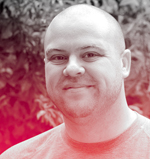
Chris Coyier is the creator of social code playground CodePen, tutorial and tips site CSS-Tricks, and the podcast ShopTalk. He is also a prolific and popular speaker.
What are your main areas of expertise?
Front End Development
Give us a summary of your career so far.
Prepress -> Print Design -> Web Design. Wufoo -> SurveyMonkey -> CodePen.
What have you been working on over the last year?
Most of my time is working on CodePen. That's new development, support and maintenance, social stuff, business stuff, the whole bag of running a web software business.
What have been the particular high points of your career?
Getting hired at Wufoo was a big deal for me. Getting invited to speak at a conference for the first time was pretty cool. Recently we hit 100k users at CodePen and that's been amazing.
What are you excited about at the moment?
Flexbox, SVG, and build processes.
Tell us about an important lesson you've learned in your career.
Be positive. There is *so much* negativity out there that you'll be doing yourself and the world a big favor if you keep the mundane negativity to yourself and spread positivity.
Name an 'unsung hero', someone you admire who deserves more recognition for their work.
Oliver Knoblich does great work.
Remy Sharp
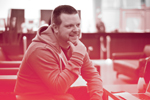
Remy is the founder and curator of Full Frontal, the UK based JavaScript conference. He also created jsbin.com, co-authored Introducing HTML5 and is one of the curators of HTML5Doctor.com. He runs his own development and training company in Brighton called Left Logic.
What are your main areas of expertise?
JavaScript and problem solving. I've been doing that since around 1996, i.e. since it wasn't cool!
Give us a summary of your career so far.
I took an industrial placement year in a finance web company, was thrown in the deep end, turns out I can swim (in code) pretty well, spent 10 years there leading teams, solving problems, and writing just about every dirty hack under the sun. Decided it was time to leave and start my own business in 2006, Left Logic, with the aim of specialising in JavaScript. Decided that I should publish as much as my work as possible, blogged a bit, made some (really great) friends over this thing called The Internet, wrote half a book (and failed to write a book before that), ran a hugely successful JavaScript conference with my wife and now am focusing my companies full time on jsbin.com with a company of 4.5 people (one is a part timer).
I had the chance to speak to 900 developers, fly to all kinds of countries, met amazing people and made new friends (when in my adult life I probably would never had the chance to), had the opportunity to inspire students about to leave university and had two photographs of myself published on the web wearing nothing only to outdo my co-author. I'm hugely honoured to be part of the web industry, it's a pretty cool place to work.
What have you been working on over the last year?
The last year has been a bit of a mixed bag, but all gone towards helping me work out what I want to focus on. JS Bin has been my passion project for 5 years, and in September 2013 I decided that I wanted to make the project self-sustaining so that we could continue to support its use in education and as part of code learning tool.
I've said goodbye to old employees and welcomed new ones - which I'm pretty excited about, and Full Frontal (our JS conference) sold out in 11 minutes last year and for me, really matured into a solid and even conference. Then there's a bunch of random side projects, and constant messing around with code that I expect will always be part of my life.
What have been the particular high points of your career?
Aside from Full Frontal, one of the real high points was having the chance to speak at a couple of universities. Then much later meeting some of the students that had attended that told me how valuable the talk was to them. If I can inspire one person to go out and get what they want, then I'm a very happy man.
What are you excited about at the moment?
My business endeavors. JS Bin is a big and exciting risk that I'm taking, and I'm putting my head down and going for it. We're aiming to release some really cool technology in JS Bin in 2014 that will make the tutorial process really interactive and if I'm honest, I'd love to see more education systems pick up JS Bin as some part of their tooling - the thought of that is what really drives me right now.
Tell us about an important lesson you've learned in your career.
To trust my gut. It's nearly always right. In business, in love, in everything. Except when it's wrong, and I'm trying to learn to also ignore my gut instinct and listen to others, not in that "listening" way that I might be waiting to speak, but really listen, ask questions and keep my ideas to myself. I'm particularly wary of this as I have new employees at Left Logic and I want to keep our working environment enjoyable.
Name an 'unsung hero', someone you admire who deserves more recognition for their work.
Gosh, that's a hard question. To *me*, the real unsung heros are mostly people that aren't blogging or speaking or have an online profile. They're people that have helped me turn a corner, or inspired me in ways that change me at the core. It ranges from my Dad's relentlessness in putting me in front of a spectrum, my computer science teacher giving me the bollocking that I needed, and my old boss finding some magic button that made me work harder than I ever had and dozens of people along the way.
If I'm honest, the biggest hero is my wife. She's stuck by me all these years, let me swan off to travel and speak. Stood by whilst I've worked stupid hours for months, even years (when we were younger), and then ran our conference under some of the most difficult conditions.
Sorry if that's the soppy answer, but it's true. They're the biggest heroes I've had the honour of having in my life.
Luke Wroblewski

Luke is best known for writing Mobile First, which advocates designing the mobile experience first and building on top of it to create the desktop site. He also wrote Web Form Design and Site-Seeing: A Visual Approach to Web Usability. He is currently CEO and co-founder of Input Factory Inc. a start-up working to create value from micro mobile interactions. Prior to that, Luke founded another company that was acquired by Twitter, and has held senior design positions at eBay and Yahoo.
Luke's blog is a valued community resource, and he is a frequent and popular conference speaker.
Jeremy Keith

Jeremy is based in Brighton and is the founder and technical director of Clearleft. He also curates dConstruct, is the author of HTML5 for Web Designers and is a regular and popular speaker at conferences.
What are your main areas of expertise?
Tying shoelaces, peeling bananas, eating cupcakes, wrapping headphones, and folding T-shirts. Seriously, you might think you already know how to do these things, but I could blow your mind.
Give us a summary of your career so far.
After dropping out of Art College, I bummed around Europe for a while, waiting for the web to be invented. Then I started making websites. I had a lot of luck. I’m still making websites.
What have you been working on over the last year?
An Aeron chair. It’s quite comfy. Please don’t mess with my chair’s settings. Thanks.
What have been the particular high points of your career?
A site I made was once Project Cool’s “Cool Site Of The Day” back in 1999. It’s been downhill ever since
Although that time last year when I went to CERN and got to hold the original document that put the web into the public domain …that was pretty special.
What are you excited about at the moment?
The Afghan Whigs have a new album coming out. I’m pretty excited about that.
Tell us about an important lesson you've learned in your career.
I’ll never forget the words a client once said to me. He said, “Who invited you to this meeting?
It’s so true. I mean, who invited any of us to this great big meeting we call life?
Name an 'unsung hero', someone you admire who deserves more recognition for their work.
Norman Borlaug, father of the Green Revolution, probably saved more human lives than any other single person in history. And yet we choose to immortalise Mother Teresa, a zealot whose religious beliefs about contraception led to immense suffering.
I’m on Team Borlaug.
But if that answer is too tangential to the topic of the web…
Brewster Kahle, founder of the Internet Archive. He’s like the web’s Bruce Wayne.
Paul Irish
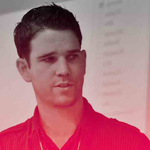
Paul is a front-end developer and web-lover who works on a huge number of useful tools that make everyone more productive. He is a Google Chrome developer advocate, and a collaborator on Modernizr, Yeoman, HTML5 Please, CSS3 Please, HTML5 Boilerplate, HTML5 Rocks, and more.
Read more about Paul in our extended interview, here.
Vote in the net Awards!
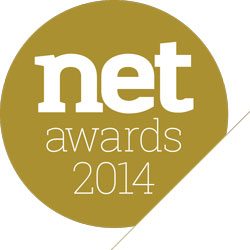
Celebrating the best in web design and development, the 15th net Awards is open for public voting until 24 March. With a record breaking number of nominations this year, it's set to be the biggest and best yet. Have your say by casting your votes here.

The Creative Bloq team is made up of a group of art and design enthusiasts, and has changed and evolved since Creative Bloq began back in 2012. The current website team consists of eight full-time members of staff: Editor Georgia Coggan, Deputy Editor Rosie Hilder, Ecommerce Editor Beren Neale, Senior News Editor Daniel Piper, Editor, Digital Art and 3D Ian Dean, Tech Reviews Editor Erlingur Einarsson, Ecommerce Writer Beth Nicholls and Staff Writer Natalie Fear, as well as a roster of freelancers from around the world. The ImagineFX magazine team also pitch in, ensuring that content from leading digital art publication ImagineFX is represented on Creative Bloq.
